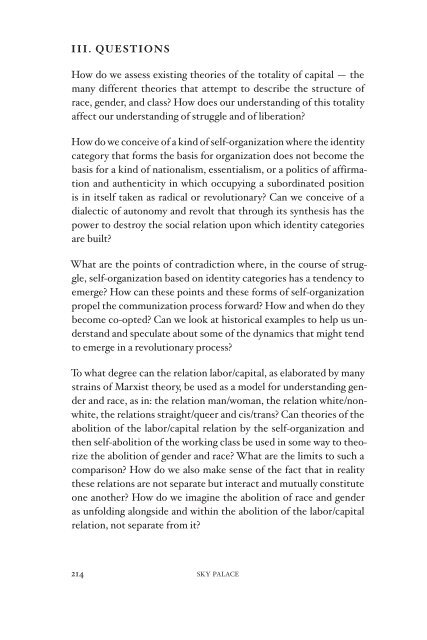Lies: A Journal of Materialist Feminism - Libcom
Lies: A Journal of Materialist Feminism - Libcom
Lies: A Journal of Materialist Feminism - Libcom
Create successful ePaper yourself
Turn your PDF publications into a flip-book with our unique Google optimized e-Paper software.
III. QUESTIONS<br />
How do we assess existing theories <strong>of</strong> the totality <strong>of</strong> capital — the<br />
many different theories that attempt to describe the structure <strong>of</strong><br />
race, gender, and class? How does our understanding <strong>of</strong> this totality<br />
affect our understanding <strong>of</strong> struggle and <strong>of</strong> liberation?<br />
How do we conceive <strong>of</strong> a kind <strong>of</strong> self-organization where the identity<br />
category that forms the basis for organization does not become the<br />
basis for a kind <strong>of</strong> nationalism, essentialism, or a politics <strong>of</strong> affirmation<br />
and authenticity in which occupying a subordinated position<br />
is in itself taken as radical or revolutionary? Can we conceive <strong>of</strong> a<br />
dialectic <strong>of</strong> autonomy and revolt that through its synthesis has the<br />
power to destroy the social relation upon which identity categories<br />
are built?<br />
What are the points <strong>of</strong> contradiction where, in the course <strong>of</strong> struggle,<br />
self-organization based on identity categories has a tendency to<br />
emerge? How can these points and these forms <strong>of</strong> self-organization<br />
propel the communization process forward? How and when do they<br />
become co-opted? Can we look at historical examples to help us understand<br />
and speculate about some <strong>of</strong> the dynamics that might tend<br />
to emerge in a revolutionary process?<br />
To what degree can the relation labor/capital, as elaborated by many<br />
strains <strong>of</strong> Marxist theory, be used as a model for understanding gender<br />
and race, as in: the relation man/woman, the relation white/nonwhite,<br />
the relations straight/queer and cis/trans? Can theories <strong>of</strong> the<br />
abolition <strong>of</strong> the labor/capital relation by the self-organization and<br />
then self-abolition <strong>of</strong> the working class be used in some way to theorize<br />
the abolition <strong>of</strong> gender and race? What are the limits to such a<br />
comparison? How do we also make sense <strong>of</strong> the fact that in reality<br />
these relations are not separate but interact and mutually constitute<br />
one another? How do we imagine the abolition <strong>of</strong> race and gender<br />
as unfolding alongside and within the abolition <strong>of</strong> the labor/capital<br />
relation, not separate from it?<br />
214<br />
SKY PALACE

















